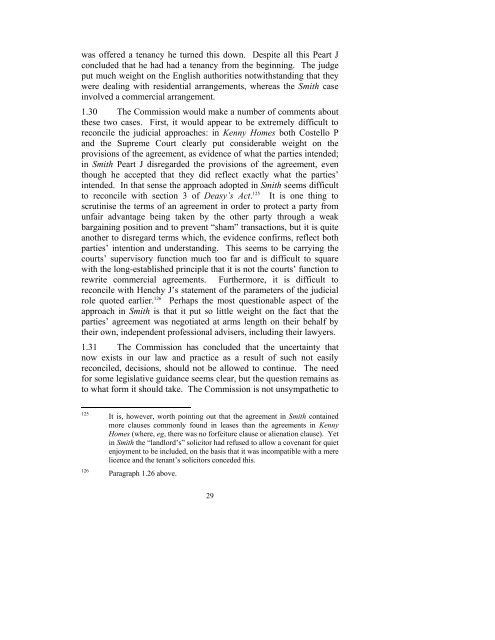Consultation Paper on the General Law of the Landlord and Tenant
Consultation Paper on the General Law of the Landlord and Tenant
Consultation Paper on the General Law of the Landlord and Tenant
You also want an ePaper? Increase the reach of your titles
YUMPU automatically turns print PDFs into web optimized ePapers that Google loves.
was <strong>of</strong>fered a tenancy he turned this down. Despite all this Peart Jc<strong>on</strong>cluded that he had had a tenancy from <strong>the</strong> beginning. The judgeput much weight <strong>on</strong> <strong>the</strong> English authorities notwithst<strong>and</strong>ing that <strong>the</strong>ywere dealing with residential arrangements, whereas <strong>the</strong> Smith caseinvolved a commercial arrangement.1.30 The Commissi<strong>on</strong> would make a number <strong>of</strong> comments about<strong>the</strong>se two cases. First, it would appear to be extremely difficult torec<strong>on</strong>cile <strong>the</strong> judicial approaches: in Kenny Homes both Costello P<strong>and</strong> <strong>the</strong> Supreme Court clearly put c<strong>on</strong>siderable weight <strong>on</strong> <strong>the</strong>provisi<strong>on</strong>s <strong>of</strong> <strong>the</strong> agreement, as evidence <strong>of</strong> what <strong>the</strong> parties intended;in Smith Peart J disregarded <strong>the</strong> provisi<strong>on</strong>s <strong>of</strong> <strong>the</strong> agreement, eventhough he accepted that <strong>the</strong>y did reflect exactly what <strong>the</strong> parties’intended. In that sense <strong>the</strong> approach adopted in Smith seems difficultto rec<strong>on</strong>cile with secti<strong>on</strong> 3 <strong>of</strong> Deasy’s Act. 125 It is <strong>on</strong>e thing toscrutinise <strong>the</strong> terms <strong>of</strong> an agreement in order to protect a party fromunfair advantage being taken by <strong>the</strong> o<strong>the</strong>r party through a weakbargaining positi<strong>on</strong> <strong>and</strong> to prevent “sham” transacti<strong>on</strong>s, but it is quiteano<strong>the</strong>r to disregard terms which, <strong>the</strong> evidence c<strong>on</strong>firms, reflect bothparties’ intenti<strong>on</strong> <strong>and</strong> underst<strong>and</strong>ing. This seems to be carrying <strong>the</strong>courts’ supervisory functi<strong>on</strong> much too far <strong>and</strong> is difficult to squarewith <strong>the</strong> l<strong>on</strong>g-established principle that it is not <strong>the</strong> courts’ functi<strong>on</strong> torewrite commercial agreements. Fur<strong>the</strong>rmore, it is difficult torec<strong>on</strong>cile with Henchy J’s statement <strong>of</strong> <strong>the</strong> parameters <strong>of</strong> <strong>the</strong> judicialrole quoted earlier. 126 Perhaps <strong>the</strong> most questi<strong>on</strong>able aspect <strong>of</strong> <strong>the</strong>approach in Smith is that it put so little weight <strong>on</strong> <strong>the</strong> fact that <strong>the</strong>parties’ agreement was negotiated at arms length <strong>on</strong> <strong>the</strong>ir behalf by<strong>the</strong>ir own, independent pr<strong>of</strong>essi<strong>on</strong>al advisers, including <strong>the</strong>ir lawyers.1.31 The Commissi<strong>on</strong> has c<strong>on</strong>cluded that <strong>the</strong> uncertainty thatnow exists in our law <strong>and</strong> practice as a result <strong>of</strong> such not easilyrec<strong>on</strong>ciled, decisi<strong>on</strong>s, should not be allowed to c<strong>on</strong>tinue. The needfor some legislative guidance seems clear, but <strong>the</strong> questi<strong>on</strong> remains asto what form it should take. The Commissi<strong>on</strong> is not unsympa<strong>the</strong>tic to125126It is, however, worth pointing out that <strong>the</strong> agreement in Smith c<strong>on</strong>tainedmore clauses comm<strong>on</strong>ly found in leases than <strong>the</strong> agreements in KennyHomes (where, eg, <strong>the</strong>re was no forfeiture clause or alienati<strong>on</strong> clause). Yetin Smith <strong>the</strong> “l<strong>and</strong>lord’s” solicitor had refused to allow a covenant for quietenjoyment to be included, <strong>on</strong> <strong>the</strong> basis that it was incompatible with a merelicence <strong>and</strong> <strong>the</strong> tenant’s solicitors c<strong>on</strong>ceded this.Paragraph 1.26 above.29
















